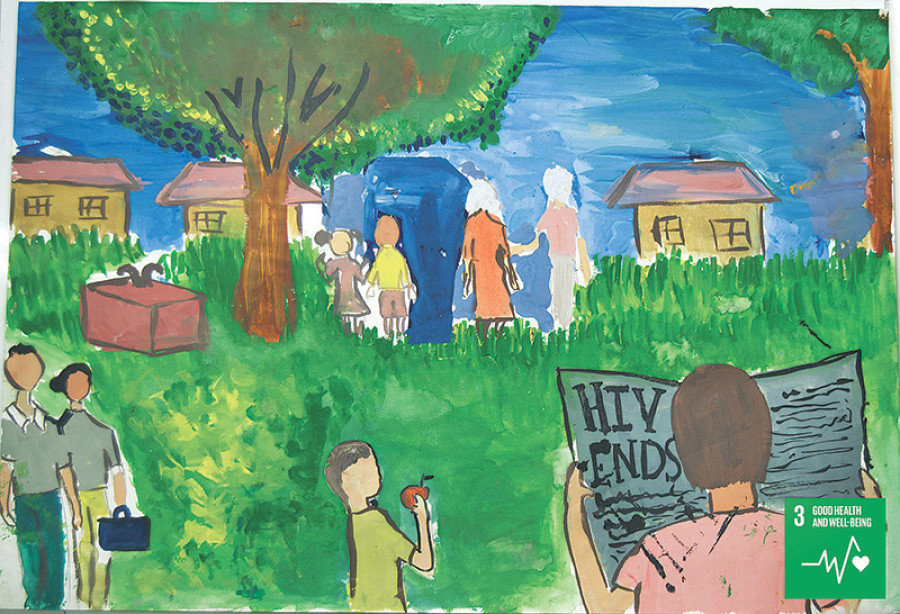Opinion
Ensure healthy lives, promote well-being
We all have a right to good health care, but we must also recognise our individual responsibility to protect our health
Manisha Koirala
Ensuring healthy lives and promoting the well-being of all people are essential to sustainable development. Major strides have been made in increasing life expectancy and reducing some of the common killers associated with child and maternal mortality. Significant progress has been made on increasing access to clean water and sanitation, reducing malaria, tuberculosis, polio and the spread of HIV/AIDS. However, more effort is needed to fully eradicate a wide range of diseases and address many different persistent and emerging health issues.
Nepal significantly reduced the maternal mortality ratio and under-5 and infant mortality rates for which the Government of Nepal (GoN) received the “Child Survival Award” from the GAVI Alliance. But although the nutritional status of children has improved substantially over the last decade, it is still low in rural areas and in mountainous regions. Even at the national level, stunting remains quite high at 37.4 percent in 2014 (Nepal Multiple Indicator Cluster Survey).
Physical, mental, emotional
I was diagnosed with cancer in 2012. I went through a six-month-long, ultimately successful, treatment that included surgery and chemotherapy. This painful process led to a long period of introspection, which enabled me to grow strong, appreciate my life and honour my body. This is why, today, I dedicate much of my time and energy to being an advocate for good health. The Sustainable Development Goal on good health and well-being is therefore very important for me personally.
Every Nepali has the right to live a healthy life. Regardless of caste, ethnicity, gender, sexual orientation or social status, and regardless of where you live, everyone has a right to good quality health care. In reality however, good health and well-being is affected by all these factors as well as issues such as education level and access to transportation. We have to hold policy makers accountable for making sure good health is available to everyone.
Prevention is always better than cure. We have a tendency to only consider our health once we reach the hospital, but many diseases cannot be diagnosed without proper check-ups. As a cancer survivor, I strongly recommend that everyone get check-ups on a regular basis: discovering a disease as early as possible can save your life.
My understanding of health is not limited to the physical. Mental and emotional health is just as important. Nepalis have been through so much political upheaval, conflict and natural disaster in the last couple of decades. It is important that we recognise this and put mental health on top of the agenda. It is sometimes stigmatised, and we all need to commit to changing this by talking more openly about it and supporting those who have mental health issues.
Four simple actions
In order to measure our progress, we need to have disaggregated data. This will help us to see where greater efforts are needed; it will also guide policy makers and health workers. I see great value in grassroots programmes that are aimed at changing attitudes, perceptions and behaviour. Whether we are talking about good nutrition, hygiene and sanitation campaigns, or promoting access to family planning, there are important health dimensions. It is essential that people are educated about the benefits of these behaviours.
We all have a right to good healthcare, but we must also recognise our own responsibility to protect our health. Each of us can commit to promoting good health and well-being in small but important ways. It is much easier to make gradual changes in lifestyle than bringing in major changes all at once. So we must take baby steps and begin with small goals towards maintaining a healthy lifestyle. Eat nutritious food. Take enough rest. Drink plenty of water. And get regular exercise. These four simple actions can radically improve your health. In particular, I am a great believer in exercise. Even if you are very busy, a 10-minute exercise session helps alleviate stress and gets endorphins pumping for any challenge. It also boosts brain chemistry to increase happiness.
We must take care of our body. It is the only place we have to live.
Koirala is an actress and UNFPA Nepal goodwill ambassador; this article is part of a weekly series on SDGs




 8.99°C Kathmandu
8.99°C Kathmandu










